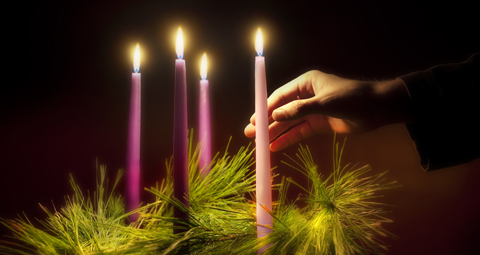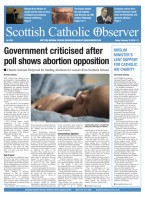December 15 | ![]() 0 COMMENTS
0 COMMENTS ![]() print
print

Advent nudges us out of the darkness
This Christmas, THE BOW IN THE HEAVENS says we should remember that peace is a fragile commodity — By FR JOHN BOLLAN
We’re now into the thick of pre-Christmas preparations. The comparatively late start of Advent has meant that we don’t have very much ‘school time’ before they break up for the Christmas holidays, so it feels that everything is a little crammed this year.
One of the highlights of the season is, of course, the primary school Christmas show. My eager reader may recall my comments last year about the wonderful inventiveness of these shows and the musical spin they put on the traditional Nativity play.
I had wondered, however, if we were running the risk of losing the actual story beneath the layers of toe-tapping songs and meticulous choreography.
Those words seem to have a struck a chord with our headteacher who, like Caesar Augustus, issued a decree that this year’s nativity would be a more straightforward ‘dressing gowns and tea towels’ affair, accompanied by each class taking turns to put on a little show of their own. I gather there was some consternation at first, when the staff’s frantic requests for a script met with the Heidie’s laconic response, ‘It’s all in there,’ as he handed them a Bible.
And you know what? I think the change was most refreshing. To my mind, it proved that you don’t really need to have made-up characters parachuted into Bethlehem—be they whoops-a-daisy camels or sleepy shepherds—to make the play more engaging for the audience.
St Joseph’s pared-back, ‘acoustic’ nativity showed that you can get the message across without losing any of the cuteness and unintentional hilarity of the infants deciding to do their own thing, no matter what the teacher may have told them.
There was even drama, as the beautifully attired Star of Bethlehem decided to carry out some elaborate moves on the balancing bench, while our hearts were in our mouths. Sure enough, one of these moves proved to be ‘the falling star,’ but she dusted herself down and got on with the job of shining brightly for all to see.
Perhaps the comedic highpoint of the play was the unscripted antics of those who should have been paying attention to the star’s movements: the three wise men.
As the local patois would have it, there was more of the ‘wido’ than the ‘wise’ about these three. For a start, they handled their precious gifts as though they were either hot to the touch or projectiles to be lobbed in the general direction of the baby Jesus.
At one point a bit of an altercation broke out between two of them, causing one to saunter offstage, the other to set off in hot pursuit, and leaving the third to stare a little disconsolately into the sea of faces before him. Once the other two, ‘the Gallagher brothers’ as I call them, had been shepherded safely back onto the stage, they quickly dispatched their gifts and carried on their feud, much to our amusement. Of course, when the time for the final bows came, they got the loudest cheer. But not from me.
Not that I wasn’t charmed and entertained in equal measure by their unique interpretation of the Magi, it was just that my inner Classicist broke free at the moment the emperor Augustus stepped forward to take his bow.
I ‘whooped’ and applauded with the fervour normally displayed only by close relatives, but I was genuinely thrilled that this figure I have studied for so many years still makes his presence felt in the Greatest Story Ever Told.
Indeed, such was my enthusiasm, and the fact that I was in the cheapest seat in the house (standing against the back wall), I think some of the audience thought I was Augustus’ dad rather than the parish priest of St Joe’s.
Last Sunday’s primary school Advent retreat also went well. There was a good turnout from our own school, especially those undertaking the Pope Francis Faith Award, and there seems to have been a good balance between activity and prayerful reflection.
At the end of Mass, I glibly joked that I was off to get the pizzas and chicken dippers in the oven, for them only to discover, either through miscommunication or strike action, that the food was still in the freezer and the volunteer was nowhere to be seen.
To make matters worse, the bus to collect the other kids from around the diocese was due in half an hour. We could not send these weans on their way home from the Bow without the food they had been promised!
Thankfully, due to the good offices of Rose, one of our hall committee, at least the oven was pre-heated, and parishioners were treated to the sight of their parish priest, still fully vested, scurrying across the car park with pizzas and chicken nuggets balanced under his chin. There may be an Advent metaphor hidden in that somewhere.
But, if patient waiting is an Advent theme, then it was certainly conspicuous by its absence on that occasion. For the first time I realised how true the saying ‘too many cooks’ is, especially if they are all hovering round the oven and opening the doors every two minutes to see how the food is coming along.
With every blast of escaping heat, someone else would shout: “Shut the door! You’re just making it worse!
I don’t mind admitting that my blood pressure was through the roof as I prayed and willed those battered chicken pieces to cook all the way through. By the time we got them out of the oven and they had passed the all-important taste test, I looked like battered chicken myself. Still, I was decidedly relieved when I overheard one of the kids warn their friends to take care because it was ‘really hot.’
This Sunday, Gaudete Sunday, coincides with the transition to the second half of the Advent season. Amidst the rejoicing of the liturgy, there will also be an added poignancy for us this year, since I will be sporting my rose vestments without Deacon Paul ‘bookending’ me on the sanctuary in the rose dalmatic I made him wear, much to his chagrin—or secret delight (I was never quite sure).
This Sunday’s first reading from the prophet Isaiah reminds us once again that the Anointed One’s coming is as much about the binding up of broken hearts as it is the inauguration of a new Messianic age. This Sunday, and this week of Advent, nudges us out of the darkness into the approaching light.
It is, of course, a movement which is mirrored in both time and season, as this week we have not just the shortest day, but the start of lengthening days too. As one who rises in darkness to take the dog for a walk, it’s always nice to know that we have a bit more light each day and that, soon, the dawn itself will start to roll back and I can leave both my torch and Jasmine’s flashing collar in the house.
Before we know where we are, the great feasts will be upon us: the liturgy is drawing us into this final week of Advent, especially during Vespers and in the Gospel acclamations, to the accompaniment of the Great ‘O Antiphons’.
Of these, perhaps my favourite is, for obvious reasons, ‘O Oriens,’ ‘O Radiant Dawn’: the prayer of the Church, both spiritually and literally, reorients us towards the East and the place where ‘the Word became flesh and lived among us.’
As we look towards the Holy Land, we are reminded, not least by recent news headlines, that peace is a fragile commodity in that place and that simmering tensions are never far from the surface.
As the Christmas rush steps up a gear, let’s not neglect those whose lives are disrupted by these ancient hostilities, not least our Christian brothers and sisters who cling on for dear life to their homes and livelihoods.
The bickering of our wee wise men is sadly mirrored in the shadows cast by historic intransigence and persecution of one faith by another. And this time it is no laughing matter. May that Radiant Dawn shine on them all this Christmas.











